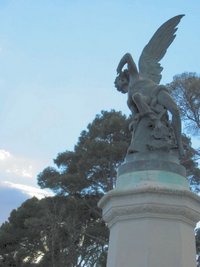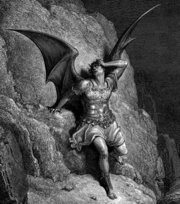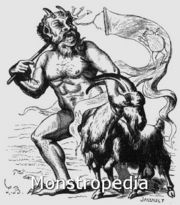Fallen angel
In Abrahamic religions, a fallen angel is an angel that has been exiled or banished from Heaven. Often such banishment is a punishment for disobeying or rebelling against God. One early source for information on angelology and demonology, is the Persian prophet Zoroaster, who is thought to have influenced Judeo-Christian beliefs [1]. The best-known fallen angel is Satan. According to some traditions, fallen angels will roam the Earth until Judgment Day, when they will be banished to Hell.
Origin
There are a number of beliefs regarding fallen angels. Many focus on issues of free will, lust, pride, or the incomprehensibility of the acts of God. An act by God of creation was foreseen as resulting in multiple outcomes, with each of these three doctrines that were traits held by certain angels. These fallen angels foresaw the doom impending. In one entity, that is both omnipotent and omnipresent, who gives certain ideas to humanity and expects only one right way to live - by universal morals, ethics and faith. However, given the doctrine of free will, each one of these ideas leads one to speculate on the basis of duality of right and wrong, good and evil, and heaven and hell.
The different facets of God
This hypothesis focuses on the concept that God has two opposite sides; a divine (or bright) side, and a shadow (or dark) side. It is believed that if mortals were to see God's bright side, His radiance would incinerate them instantly. Therefore, a dark side was necessary for Him to communicate with mortals. As Judaism evolved, so, too, did the sides of God. Initially, the shadow side became "God's Word" and then the "Voice". In time, it came to be considered a separate being with its own free will, far removed from the bright side of God. The dark side began to take on some negative aspects with which mortals were familiar — destruction, betrayal, temptation, etc. Eventually, the dark side of God became known as Satan. There is no Biblical evidence supporting this hypothesis. The word "Satan" is a version of the Hebrew word "ShTN", meaning "adversary". (http://dictionary.oed.com/cgi/entry/50213669)
Consequences of free will
It is generally accepted by most Christians that the fallen angels were cast out of Heaven because of free will. Pride, being the most grave of sins, is usually taught as the reason the angels were expelled from Heaven.
Origen
Origen, a father of the early Christian Church, believed that God had created all angels to be equal and free. However, in possessing the power of free will, some of them began to move further away from God of their own volition.
Origen maintained that those who drifted the least remained in the regions closest to God, while those who moved further out fell into lower air, and became what we know as "angels". This is the lowest order of the angelic hierarchy. Those who moved still farther away became humans, and finally those who moved the farthest away from God became "demons", who reside in Hell
Origen states metaphorically that, although some angels fell and became humans or demons, all hope is not lost. By practicing virtue, men and demons can again become angels. While considered an early Father of the Church, Origen was deemed a heretic as a result of some of his writings and teachings, which did not conform to accepted scripture or tradition. Mainly, his concept of Apocatastasis, the belief that all beings (humans, fallen angels, demons and Satan) will return to God through God's love and mercy, was deemed unacceptable at that time. His excommunication was posthumously reversed.
Lust
The following comes from a series of ancient texts referenced in the Bible called "The Three Books of Enoch", a set of books found in the Pseudepigrapha of the Old Testament.
According to these books, it is because of lust that some angels fell from Heaven. God asked the "Watchers" (Grigori), a select group of angels, to assist the Archangels in the creation of Eden. Those Grigori who descended to Earth saw the daughters of men and became enchanted with them. Consequently, the Grigori began to reveal to man some of the secrets of Heaven, such as astrology, weapons production, and the vanity of enhancing the face and body with perfumes and cosmetics. The Grigori then fell in love with human women. According to the text, some of the Grigori even took wives and created offspring, giants known as the Nephilim. This made God so angry that he cursed those Grigori who had betrayed Him, threw them out of Heaven, made them mortal and transformed them into demons. God sent the Great Flood to cleanse the Earth of the wanton killing and destruction perpetrated by the Nephilim. Notable angels who fell in this account are Semyazza, Samael, and Azazel. A single verse from the Book of Genesis in the Old Testament alludes to the "sons of God" intermarrying with the "daughters of Man" to create a species known as "Nephilim".
Pride
This belief involves Lucifer's rebellion against God, well known amongst Christians. Pride, the gravest of the seven deadly sins, eventually led to the expulsion from Heaven of certain beings, up to and including the highest orders of angels. Lucifer, who himself succumbed to pride, was the first and mightiest angel to be created. With intelligence, radiance, beauty, and power unmatched among all of the angels in Heaven, Lucifer was second in majesty only to God Himself.
Unfortunately, Lucifer became ambitious and self-centered, eventually deciding to prove his power by raising his throne to the height of God's throne. Other angels did not approve of Lucifer's plan; they did not want a lower being trying symbolically to become the equal of God. When Lucifer enacted his scheme, he was instantly hurled out of Heaven. This account of the rebellion might have come from several ancient Canaanite manuscripts that deal with Shahar, one of their own deities.
Catholic theologians have speculated that the incarnation of Christ was revealed to the angels. The idea that all of Heaven must bow before Christ, formed in part from the lesser nature of humanity, supposedly motivated the prideful actions of Lucifer (cf. Suarez, De Angelis, lib. VII, xiii).
Bowing to mankind
This belief states that God mandated that angels bow before men. It is said that when God created mankind, He wanted His angels to acknowledge man by bowing down to him, but some of the angels did not obey His mandate. The origin of this idea is most likely the "Vita Adae et Evae", an apocryphal text which most scholars agree was written somewhere near the end of the 10th century AD.
- XIII: The devil replied, 'Adam, what dost thou tell me? It is for thy sake that I have been hurled from that place. When thou wast formed, I was hurled out of the presence of God and banished from the company of the angels. When God blew into thee the breath of life and thy face and likeness was made in the image of God, Michael also brought thee and made (us) worship thee in the sight of God; and God the Lord spake: Here is Adam. I have made thee in our image and likeness.'
- XIV: And Michael went out and called all the angels saying: 'Worship the image of God as the Lord God hath commanded.' And Michael himself worshipped first; then he called me and said: 'Worship the image of God the Lord.' And I answered, 'I have no (need) to worship Adam.' And since Michael kept urging me to worship, I said to him, 'Why dost thou urge me? I will not worship an inferior and younger being. I am his senior in the Creation, before he was made was I already made. It is his duty to worship me.'
- XV: When the angels who were under me heard this, they refused to worship him. And Michael saith, 'Worship the image of God, but if thou wilt not worship him, the Lord God will be wroth with thee.' And I said, 'If He be wroth with me, I will set my seat above the stars of heaven and will be like the Highest.'
- Anon. Vita Adae et Evae, 13–15. [2]
Disobedience and pride
In John Milton's epic poem, "Paradise Lost", Azazel is the standard-bearer of the infernal host led by Satan. According to the Qur'an, when God commanded the angels to worship Adam, Azazel replied: "Why should the son of fire fall down before a son of clay?" and God cast him out of Heaven. His name was then changed to Eblis, which means "despair".
- Then straight commands that, at the warlike sound
- Of trumpets loud and clarion, be upreared
- His mighty standard. That proud honour claimed
- Azazel as his right, a Cherub tall:
- Milton: Paradise Lost, Book I, vv530–533. [3]
The version that appears in the Qur'an appears to be a slightly different version of the "Vita Adae et Evae" account.
Obedience to God
There is a Sufi version of the story that states that Lucifer was the angel who loved God the most. At the time of the angels' creation, God told them to bow to no one but Him.
However, God created mankind, whom he considered superior to the angels, and commanded the angels to bow before the new figure, forgetting his previous commandment. Lucifer refused, partly because he could not forget the first commandment, but also because he would bow to his beloved God only. The other angels saw Lucifer as insubordinate, and expelled him from Heaven.
Those who believe in this version do not consider Lucifer or the fallen angels to be demons, since they did not rebel against God by refusing his mandate, but rather believed that creatures should bow before only God, and no one else.
Fallen angels by rank
Some of the fallen were supposedly members of more than one rank, but this list will only list the primary rank, or the rank that is most well-known, of each apostate angel. For more information, see the articles of the various entities.
First Sphere
Second Sphere
Third Sphere
Others
Please be aware that a great many of these links either do not exist on wikipedia or simply redirect you. Many redirect you to the page for the "Book of Enoch" which lists a large number of 'the fallen'; such pages are denoted with an asterik (*).




